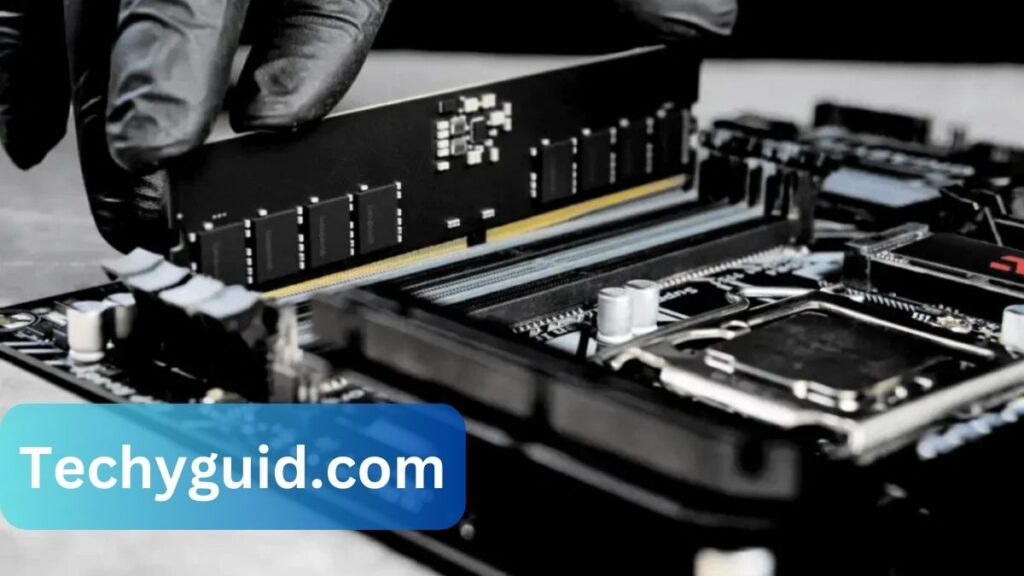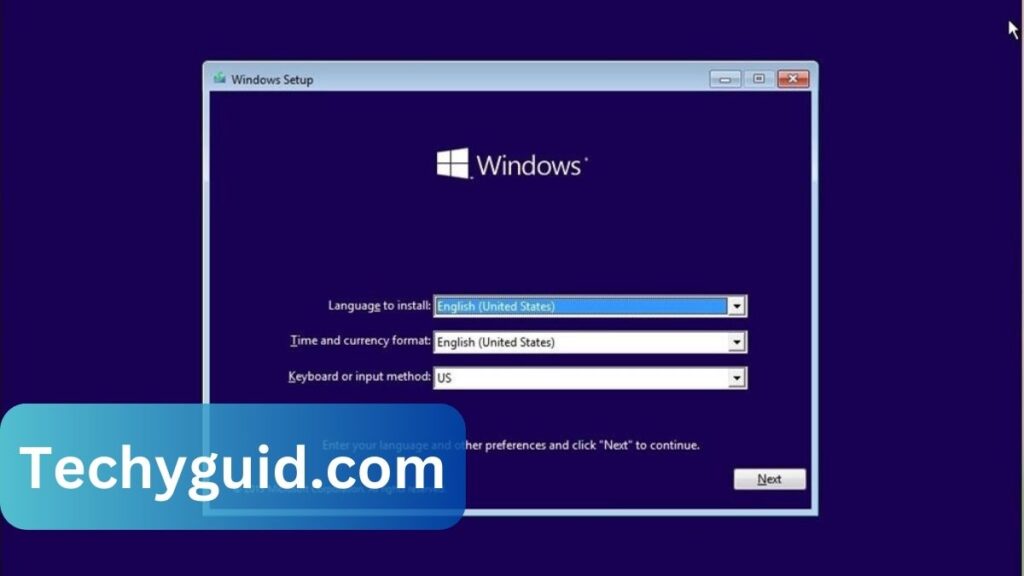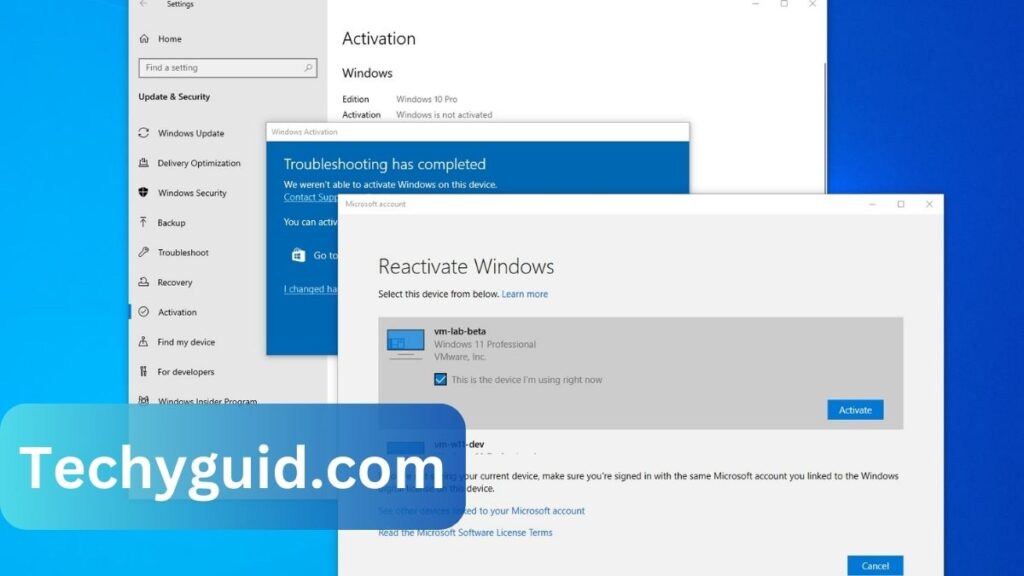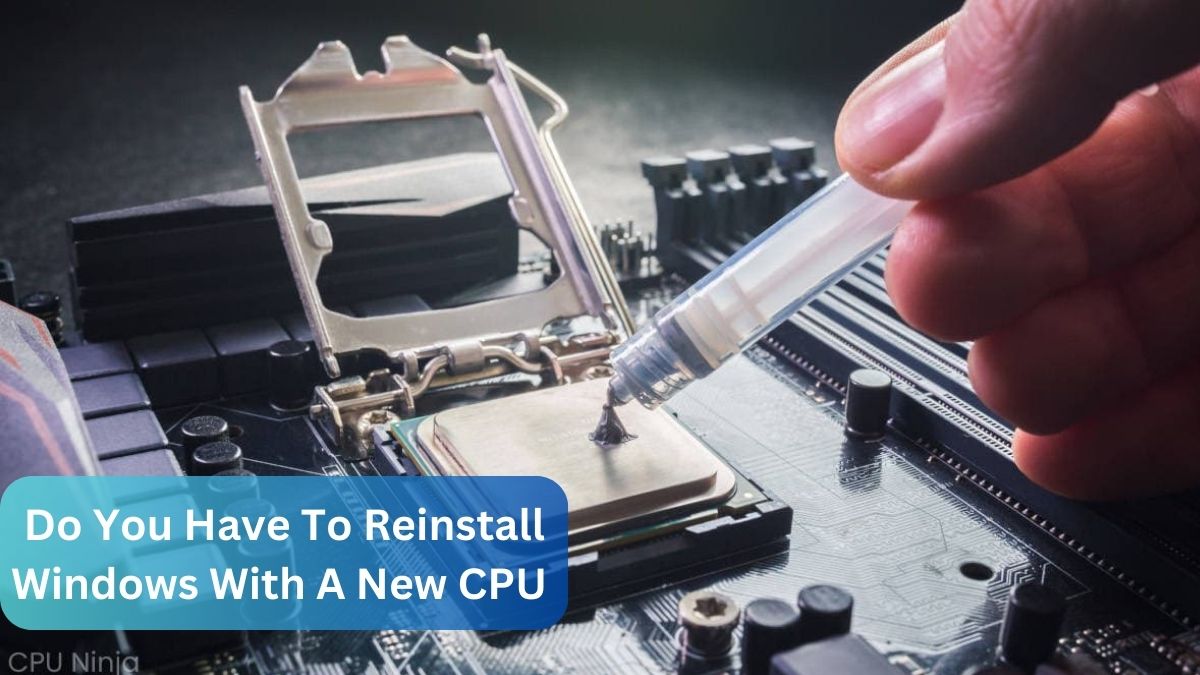No, you usually don’t need to reinstall Windows when upgrading to a new CPU, as modern systems can detect the new hardware and adjust automatically. However, if you’re also changing the motherboard, or if there are compatibility issues, a fresh Windows installation might be necessary. Always back up your data before making hardware changes.
When I upgraded my CPU last year, I didn’t have to reinstall Windows because my motherboard was compatible, and everything worked fine after a BIOS update. However, if you’re wondering, do you have to reinstall Windows with a new CPU, it depends on your setup—always check compatibility first!
In this article we discuss about “Do You Have To Reinstall Windows With A New CPU”.
Table of Contents
What Happens When You Install a New CPU?
When you swap out your CPU, your system undergoes a significant hardware change. The operating system (OS) must recognize and configure itself to work with the new processor. Most modern systems have plug-and-play capabilities, allowing Windows to detect and adapt to the hardware without requiring a reinstall.
When Is Reinstalling Windows Necessary?
There are specific scenarios where reinstalling Windows becomes necessary:

- Major Hardware Changes: If you upgrade your CPU and motherboard simultaneously, the system might struggle to boot due to driver conflicts.
- Incompatible Drivers: Outdated drivers can cause instability, forcing you to perform a clean installation.
- Corrupted System Files: Sometimes, a CPU swap can lead to unexpected errors or corrupted files.
How Windows Handles Hardware Changes
Windows is designed to adapt to most hardware changes. It detects the new CPU, installs the necessary drivers, and configures settings. However, the success of this process largely depends on the compatibility of your motherboard and the chipset.
Signs You Might Need to Reinstall Windows
Here are some red flags that a Windows reinstall might be unavoidable:
- Frequent crashes or BSOD.
- Boot failures or long boot times.
- Applications freezing or system instability.
Read Most Important: Amd cpu vasp av520 – Full Ultimate Guide 2025!
Steps to Avoid Reinstalling Windows
To minimize the chances of a Windows reinstall, follow these steps:
- Update Drivers: Ensure your chipset and processor drivers are up to date.
- Check Compatibility: Confirm your new CPU is supported by your motherboard.
- Backup Your Data: Create a backup of essential files in case something goes wrong.
How to Upgrade Your CPU Without Reinstalling Windows
Here’s a quick guide to upgrade your CPU seamlessly:
- Check Compatibility: Verify that your new CPU is supported by your motherboard.
- Update BIOS: Install the latest firmware for your motherboard.
- Remove the Old CPU: Carefully detach it and clean the socket.
- Install the New CPU: Insert the new processor and secure it properly.
- Boot and Test: Start your PC and check if Windows recognizes the CPU.
The Role of the Motherboard in CPU Upgrades
Your motherboard plays a crucial role in determining whether you need to reinstall Windows. If you’re keeping the same motherboard, Windows is less likely to require a fresh install. However, a new motherboard often means new drivers and settings, which can lead to conflicts.
BIOS and Firmware Updates: Do They Help?
Updating your BIOS ensures that your motherboard can handle the new CPU. This step often resolves compatibility issues and minimizes the risk of needing a Windows reinstall.
How Windows Activation Is Affected
Upgrading your CPU might not affect your Windows activation status. However, if you also replace the motherboard, Windows might consider it a new machine, prompting you to reactivate your license.
Common Errors After a CPU Upgrade
Some common issues include:
- BSOD Errors: These can occur if drivers are outdated or corrupted.
- Performance Lags: Misconfigured settings can lead to underperformance.
Do You Need To Back Up Your Data?

Always back up your data before any hardware upgrade. Use tools like external drives or cloud storage to ensure your files are safe.
Tips for a Smooth Transition
- Research Thoroughly: Check forums and manufacturer guidelines for compatibility tips.
- Use Diagnostic Tools: Tools like CPU-Z can help ensure your hardware is ready.
Expert Recommendations
IT professionals suggest performing a fresh install only if major issues arise. Otherwise, with proper preparation, you can upgrade without any trouble.
Do You Need to Reinstall Windows When Swapping CPUs?
The short answer is: not always. In most cases, replacing your CPU doesn’t require a complete Windows reinstallation. However, there are exceptions depending on your hardware configuration and the version of Windows you’re using.
Read Most Important: Should You Cover CPU All The Way – Ultimate Guide 2024!
Why You Don’t Have to Reinstall Windows When Swapping CPUs
Modern Windows operating systems, such as Windows 10 and 11, are highly adaptive to hardware changes. They automatically detect and install drivers for new components, including CPUs. As long as your motherboard remains the same, the operating system can reconfigure itself to accommodate the new processor.
What Happens When Swapping from AMD to Intel or Vice Versa?
Switching between AMD and Intel platforms adds complexity. These CPUs use different architectures, which may cause Windows to fail to boot due to incompatible drivers. In such cases, a fresh installation or preemptive driver uninstallation before the swap can help avoid issues.
Surely, Changing the Motherboard and CPU Means Reinstallation?
Yes, combining a motherboard and CPU upgrade often leads to a more complex situation. A motherboard swap changes critical hardware identifiers, potentially deactivating your Windows license. While you might not always need a full reinstallation, reactivation through Microsoft’s account system or a fresh license might be necessary.
One Crucial Thing You Must Remember After Upgrading
After replacing your CPU, ensure you:
- Update your motherboard’s BIOS to support the new processor.
- Install the latest chipset drivers for stability and performance.
Neglecting these steps can lead to boot issues or reduced performance.
Windows 11 and TPM: A New Requirement
Windows 11 enforces TPM (Trusted Platform Module) requirements, which are often tied to the motherboard and CPU. If your motherboard doesn’t support TPM or it’s disabled in the BIOS, Windows 11 might refuse to run after a hardware swap.
How Modern Windows Makes Hardware Swapping Easier
Thanks to improvements in Windows’ plug-and-play capabilities, hardware detection and driver installation are often seamless. This convenience minimizes the need for reinstallation even after significant upgrades.
Troubleshooting Common Issues After CPU Swaps
If you encounter boot errors or activation issues:
- Boot Errors: Use recovery tools or reinstall critical drivers.
- Activation Issues: Link your Microsoft account to your license beforehand, making reactivation simpler.
How to Prepare Your System Before Swapping CPUs
- Back up your data.
- Link your Microsoft license to your account.
- Update your operating system and drivers.
- Uninstall old CPU-specific drivers.
Do You Need a New Windows License After Upgrading?

A CPU upgrade alone doesn’t usually require a new license. However, adding a new motherboard might. Make sure your Windows license is linked to your Microsoft account for easy reactivation.
What About Gaming and Performance Post-Upgrade?
A CPU upgrade can significantly enhance gaming performance. After installation, update your graphics drivers and optimize in-game settings to harness the new power.
Tips for Ensuring Stability After CPU Swaps
Run stress tests like Prime95 or Cinebench to verify the stability and performance of your new CPU. Monitor temperatures using tools like HWMonitor to avoid overheating.
Future-Proofing Your System During Hardware Upgrades
Choose a CPU and motherboard combination with support for emerging technologies like PCIe 5.0 and DDR5 memory to ensure your system stays relevant for years.
Upgrading CPU. Do I need to reinstall Windows?
No, you don’t need to reinstall Windows when upgrading only the CPU. Modern Windows versions can adapt to hardware changes, as long as the motherboard remains the same.
Read Most Important: AdoptOpenJDK 11.24.8 Pegging CPU Due to PrintStream – Ultimate Guide 2025!
Upgrading CPU and motherboard, do I need to reinstall Windows?
Yes, in most cases, you may need to reinstall Windows. Changing the motherboard often alters hardware identifiers, which can cause activation issues or compatibility problems.
Do I need to reinstall Windows if I change the CPU?
Not necessarily. Windows automatically detects the new CPU and installs compatible drivers, making reinstallation unnecessary in most cases.
Do you need to reinstall Windows after replacing the CPU?
Generally, no. Windows is designed to handle CPU changes without a full reinstall. Just ensure your BIOS is updated and all components are properly configured.
Upgrading Your Processor: Do You Need to Reinstall Windows?
Upgrading your processor alone doesn’t usually require a Windows reinstall. However, a clean installation might be beneficial if you encounter performance issues or errors.
How can I change my CPU without reinstalling Windows?
Backup your data, update your BIOS, and install the CPU. After the swap, let Windows detect the new hardware and install drivers automatically for a smooth transition.
Do you have to reinstall Windows with a new CPU Windows 10?
No, you don’t need to reinstall Windows 10 when changing only the CPU. Windows 10 automatically adapts to the new processor and installs the necessary drivers.
Do you need to reinstall Windows after replacing the motherboard?
Yes, replacing the motherboard often requires reinstalling Windows. The new motherboard changes hardware identifiers, which may lead to activation and compatibility issues.
Do I need to reinstall Windows with a new motherboard Reddit?
According to Reddit users, it’s usually necessary to reinstall Windows with a new motherboard. This ensures proper driver compatibility and resolves potential activation problems.
Do you need to reinstall Windows after replacing CPU Reddit?
No, you don’t need to reinstall Windows after replacing just the CPU. Reddit users often recommend updating the BIOS and installing new drivers instead.
Do you have to reinstall Windows with a new GPU?
No, replacing a GPU doesn’t require reinstalling Windows. You only need to install the correct graphics drivers for the new GPU.
Do I need to reinstall Windows 11 with a new CPU?
No, Windows 11 doesn’t require reinstallation for a CPU upgrade. Just ensure TPM is enabled and the new CPU is supported by your motherboard.
Do I need to reinstall Windows when switching from Intel to AMD?
Yes, switching from Intel to AMD may require a fresh Windows installation. The architectures are different, and a clean install avoids driver conflicts and compatibility issues.
Do I need to reactivate Windows with a new CPU?

No, a CPU upgrade doesn’t require reactivating Windows. Activation is tied to the motherboard, so as long as it remains unchanged, you’re good to go.
Do I need to install drivers after a CPU upgrade?
Usually, no additional drivers are needed for the CPU itself, as Windows installs them automatically. However, updating chipset drivers is recommended for better performance and stability.
Read Most Important: Blender using cpu when ive told it not to – Guide 2024!
FAQs
Will upgrading my CPU delete my files?
No, upgrading your CPU won’t delete your files. Your data is stored on your storage drive, not the CPU. However, it’s always a good idea to back up your files before making any hardware changes.
Can I upgrade my CPU without changing the motherboard?
Yes, you can if your motherboard supports the new CPU. Check your motherboard’s compatibility with the CPU’s socket type and chipset to ensure it works properly.
How do I reactivate Windows after a hardware change?
Link your Windows license to your Microsoft account before the upgrade. After the hardware change, use the Windows Activation Troubleshooter to reactivate it easily.
What if my PC doesn’t boot after a CPU upgrade?
Check that the CPU is properly installed and update the BIOS. Ensure all cables and components are securely connected, and try resetting the BIOS to default settings.
Is it better to reinstall Windows after a CPU upgrade?
Not usually. Windows can adapt to the new CPU, but if you switch between AMD and Intel or encounter issues, a clean reinstall might be helpful for better performance.
Conclusion
Upgrading your CPU doesn’t usually require reinstalling Windows, as modern operating systems adapt to hardware changes seamlessly. However, significant upgrades like replacing the motherboard or switching between AMD and Intel may necessitate a fresh installation. Always ensure compatibility, update BIOS, and back up your data for a smooth transition.
Read Most Important:

[…] Read also: Do You Have To Reinstall Windows With A New CPU – In 2024? […]
[…] Read Important: Do You Have To Reinstall Windows With A New CPU – In 2024? […]
[…] Read Important: Do You Have To Reinstall Windows With A New CPU – In 2024? […]
[…] Read Most Important: Do You Have To Reinstall Windows With A New CPU – In 2024? […]